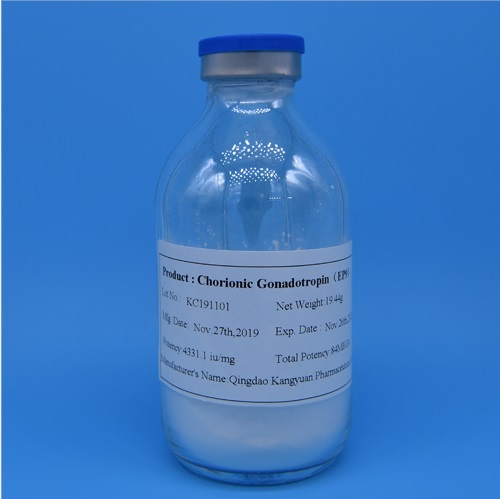Human Menopausal Gonadotropin (hMG) is a hormone commonly used in fertility treatments. It is a combination of follicle-stimulating hormone (FSH) and luteinizing hormone (LH) extracted from the urine of postmenopausal women. In this article, we will discuss the role of hMG in fertility treatment and its benefits.
Mechanism of Action: hMG works by stimulating the ovaries to produce multiple eggs during a woman's menstrual cycle. FSH promotes the growth and development of follicles in the ovaries, while LH triggers ovulation. This hormone combination helps to enhance the chances of successful fertilization.

Administration and Dosage: hMG is typically administered through injections. The dosage and timing depend on the individual's fertility treatment plan, as determined by a fertility specialist. Regular monitoring through ultrasound and hormone level tests is crucial to ensure the appropriate dosage for optimal results.
Indications for Use: hMG is commonly prescribed for women with ovulation disorders or those undergoing assisted reproductive techniques such as in vitro fertilization (IVF) or intrauterine insemination (IUI). It can also be used for men with low sperm count or hormonal imbalances that affect fertility.
Advantages: a. Increased egg production: hMG stimulates the ovaries to produce multiple eggs, increasing the chances of fertilization. b. Personalized dosage: Dosage can be adjusted according to each individual's response, increasing the success rate of the treatment. c. Versatility: hMG can be used alone or in combination with other fertility medications, tailoring the treatment to the patient's needs. d. Suitable for different infertility causes: Whether the infertility is due to hormonal imbalance or fallopian tube issues, hMG can be an effective treatment option.
Risks and Considerations: a. Ovarian Hyperstimulation Syndrome (OHSS): Overstimulation of the ovaries can lead to OHSS, a condition with symptoms ranging from mild abdominal discomfort to severe complications. Regular monitoring and proper dosage adjustments can minimize the risk. b. Multiple pregnancies: Due to the increased egg production, there is a higher chance of multiple pregnancies. This should be discussed and understood before initiating the treatment. c. Side effects: Common side effects include injection site reactions, abdominal bloating, mild mood swings, and breast tenderness. However, these are temporary and usually resolve once the treatment is completed.
Human Menopausal Gonadotropin plays a significant role in fertility treatment by stimulating egg production and facilitating ovulation. Its versatility, personalized dosage, and effectiveness make it a popular choice for addressing various infertility causes. However, it is essential to be aware of the potential risks and side effects associated with the treatment. Consulting with a fertility specialist will help determine if hMG is the right option for your fertility journey, ensuring the best possible chances of achieving pregnancy.